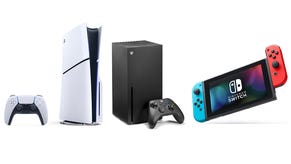Game Changers
Move, Natal, 3D, Blu-ray, Live - which technologies will define the console battlefield in the coming years?
Every year since the launch of the PlayStation 3 has been confidently touted, by one commentator or another, as being Sony's Year. Perhaps it's difficult to let go of the idea that Sony is the market leader, or perhaps the company is better at wining and dining analysts than its rivals, but either way, the reality has never quite matched up to those expectations.
On the contrary, these regular pronouncements have become something of a joke among gamers and industry alike - with Sony's self-appointed cheerleaders having now cried wolf so often that they'll find it pretty difficult to be taken seriously even when they're actually right.
As such, it's not entirely surprising that most people seem to be taking a hefty pinch of salt with Strategy Analytics' report this week that the PS3's global market share comfortably outstripped the 360 in the first quarter of 2010. The facts aren't really in question - the PS3 is absolutely doing better than it was previously. The lasting impact, however, is trickier to calculate.
In the quarter covered by the report, after all, the PS3 was still in the afterglow of the launch of the PS3 Slim and accompanying price cut, not to mention benefiting from the arrival of key software titles such as God of War 3 and Final Fantasy XIII (a multi-platform release, but a franchise with a strong attachment to the PlayStation brand).
By comparison, the big hitters for the Xbox 360 are heavily loaded into the back end of the year, with Halo: Reach due in September, and Natal arriving in time for Christmas, probably a few months after Sony's PlayStation Move system appears on shelves. The possibility of a redesigned, slimmer Xbox 360 being unveiled at E3 remains a wild-card, much like the chance of autumn price cuts from either manufacturer.
It's likely, in other words, that Sony and Microsoft will go toe-to-toe on "special events" which influence their sales - exclusive titles, redesigns, new hardware and price cuts. It's a tit-for-tat approach to the console battle, a war of attrition in which it's unlikely that any major points will be scored on either side.
To truly tip the sales balance in favour of either side would take an unexpected, major event - for Move to be quantifiably, obviously superior to Natal, for example, could tip several million sales in Sony's direction. That is, however, highly unlikely - both systems will almost certainly be perfectly competent at their own fields of specialisation, both will be graced with decent if not world-shaking software, and neither will genuinely cause Nintendo executives to lose any sleep.
The possibility of such seismic shifts in the patterns of sales make for exciting, if ill-informed, headlines on blog sites, but they simply aren't how the market generally plays out. There are, however, a number of interesting underlying factors which could signal gradual shifts in how the console race moves in the coming year.








